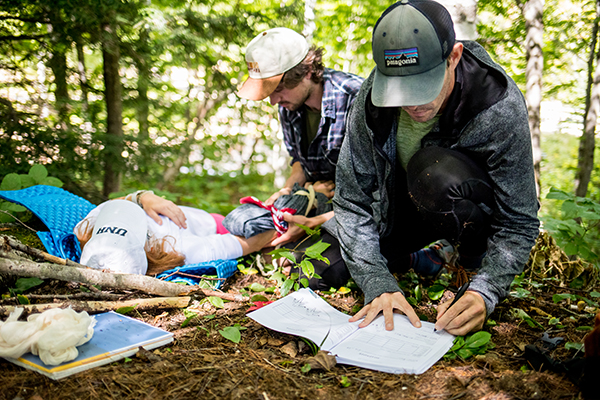
Wilderness First Aid
Accidents happen. People get hurt, sick, or lost. The temperature drops, the wind picks up, and it starts to rain. Would you know what to do? Many backcountry emergencies are preventable, and even when bad things happen, sometimes the wrong care can make things worse. By learning a few basic skills, you can make the difference between a good outcome and a bad one-and maybe even save a life.
BECOME THE PARTNER YOU SEEK
WFA COURSE DETAILS
Length: 2 Days
When:
March 29-30, 2025
Where: White Mountains, NH
COST
2 Day WFA Course: $250
WHAT TO EXPECT
Itinerary
- WILDERNESS FIRST AID
- Day One - 9AM-5PM
- Day Two - 8AM - 5PM
Skills Taught
The WFA is 16 hours long (two days), and focuses on the basic skills of: Response and Assessment, Musculoskeletal Injuries, Environmental Emergencies, Survival Skills, Soft Tissue Injuries, and Medical Emergencies.
What Do I Need?
FOR THIS COURSE, YOU WILL NEED THE FOLLOWING
You should plan to wear or have with you clothing that will be appropriate to the season and location. Weather permitting; we will be spending a significant portion of the class time out-of-doors. If you have questions regarding the usual weather in the White Mountains, please contact us. The following list is to SUPPLEMENT the clothing you will be wearing.
PERSONAL PROTECTIVE EQUIPMENT
*You MUST have these items with you in order to attend the course. If you arrive to the course without this gear, the instructor may have options for you to purchase. However, if they do not, you will be asked to leave for the safety of yourself and others in the class.
2 Face masks (cloth, surgical, N95, or KN95 – needs to fully cover your nose, mouth, and chin)
Hand sanitizer (for personal use only – will not be shared with others)
NECESSARY ITEMS
Notebook and pen/pencil
Raingear tops and bottoms
Layers of clothing (so you can take a layer off if you are hot/put one on if you are cold, these are also used for splinting)
Hat - warm, not made of cotton
Mittens or gloves if it will be cold out
Backpack to put everything in
Reusable water bottles (1qt or 1 liter) for drinking water
Footwear for the environment (Closed-toe shoes for being outdoors- sandals are only acceptable for indoor activity.)
HELPFUL ITEMS TO BRING
Ground cloth or small tarp (6X4 sheet of plastic is fine)
Sleeping pad (Examples: Ensolite, Ridgerest, Thermarest)
Bandanas or cravats of any kind
Parachute cord
Book Online Here
Searching Availability...

 We are proud to work with the Department of Agriculture, the White Mountain National Forest and the Androscoggin Ranger District where we are authorized outfitter guides.
We are proud to work with the Department of Agriculture, the White Mountain National Forest and the Androscoggin Ranger District where we are authorized outfitter guides.
